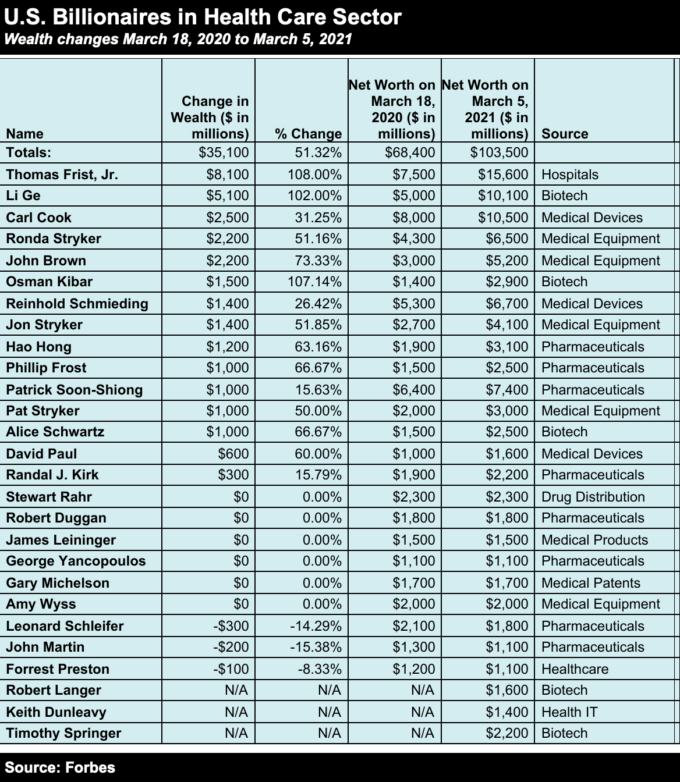Not everyone is suffering during the pandemic.
The Frist family of Tennessee are the founders and biggest shareholders of Hospital Corporation of America (HCA), the largest for-profit hospital conglomerate in the U.S. Thomas F. Frist Jr. and his family have seen their personal wealth increase from $7.5 billion on March 18, 2020 to $15.6 billion on March 8, 2021, an increase of $8.1 billion or 108 percent, according to an analysis by the Institute for Policy Studies.
Almost half of these gains — $4 billion — have come since September 2020, when Forbes reported the Thomas F. Frist Jr. family wealth at $11.5 billion. The Frists have an estimated 20 percent ownership stake in HCA.
Of the 27 U.S. billionaires whose wealth comes from the health care sector, the Frists have seen the single greatest pandemic wealth gains, even compared to fortunes from big pharma and bio-tech. HCA is the only hospital owner on the list of 27 health care billionaires.

Pandemic Profiteering
The surging wealth gains of the Frist family come as health care workers and their patients face enormous strains. As Francesca Newton writes in her Tribune piece, “10 Ways Corporations Have Exploited Covid-19,” “While key workers put their lives on the line to keep the country running, and mutual aid groups desperately tried to plug the holes created by decades of cuts to our social fabric, billionaires and big corporate interests have made a killing.”
HCA has reaped enormous profits by squeezing workers and cutting costs, while showering top management with lavish compensation.
Profits
HCA made nearly $4 billion in profits in 2020 during the pandemic, up more than $200 million from 2019. At the same time the company cut supply costs by $112 million, even though workers spoke out for months about inadequate PPE and having to reuse single use equipment like masks and gloves.
CEO Pay
HCA CEO Sam Hazen was paid $27 million in 2019, making him the highest paid CEO in the hospital sector for that year (2020 figures will be released in mid-March). Hazen’s 2019 compensation was higher than the CEO of Humana, $16.7 million. His pay is 478 times the median HCA employee, up from 383 times in 2018. His pay is over 1,038 times the lowest paid worker at HCA, which is $12.50 at its El Paso facility. Hazen is paid roughly $13,000 an hour. According to the Economic Policy Institute, the average ratio of U.S. CEO pay to median worker was 320 to 1 in 2019.
Staffing Levels
In 2019, HCA’s staffing levels were 29 percent below the national average. HCA’s low staffing levels have been linked to poor patient outcomes. For example, low staffing levels at HCA’s Colorado hospitals may have contributed to patient death as well as other preventable harm.
Impact on Frontline Health Care Workers
In addition to inadequate staffing levels and insufficient supplies for PPE, poor wages have been the focus of HCA critics for some time. But the issue worsened during the pandemic as frontline health care workers were forced to take much greater risks. Meanwhile, HCA continued to push back on worker demands. For example, it successfully delayed the vote to unionize 1,800 nurses at its Mission Hospital in Asheville, North Carolina for six months, claiming that delay was necessary during a pandemic.
Frist Family Wealth and U.S. Billionaires
The surge in wealth flowing to Frist family is extraordinary, even for U.S. billionaires who have seen their wealth accelerate during the pandemic. U.S. billionaires have seen their wealth increase $1.3 trillion, or 44 percent, over the 11 months since the beginning of the pandemic lockdowns in March 2020, according to an analysis by Americans for Tax Fairness (ATF) and the Institute for Policy Studies (IPS). The combined wealth of 660 U.S. billionaires now tops $4.2 trillion.
For perspective, the $4.2 trillion in wealth is nearly double the collective $2.4 trillion in wealth held by the entire bottom half of American society, or 165 million people.
